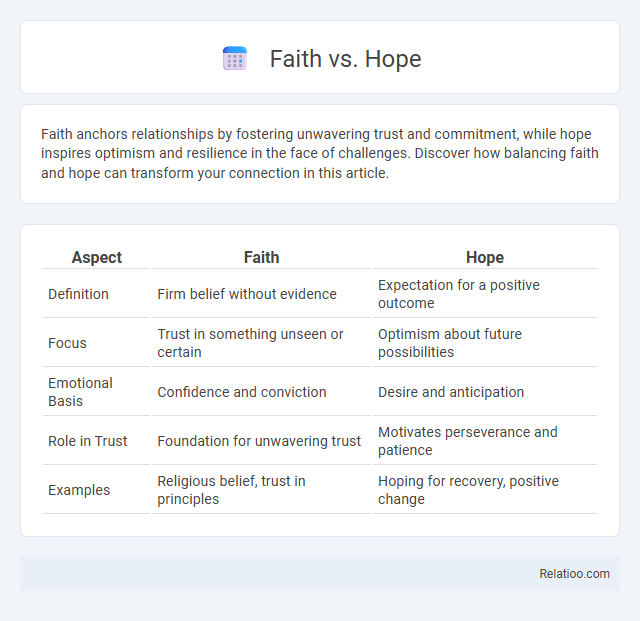Faith anchors relationships by fostering unwavering trust and commitment, while hope inspires optimism and resilience in the face of challenges. Discover how balancing faith and hope can transform your connection in this article.
Table of Comparison
| Aspect | Faith | Hope |
|---|---|---|
| Definition | Firm belief without evidence | Expectation for a positive outcome |
| Focus | Trust in something unseen or certain | Optimism about future possibilities |
| Emotional Basis | Confidence and conviction | Desire and anticipation |
| Role in Trust | Foundation for unwavering trust | Motivates perseverance and patience |
| Examples | Religious belief, trust in principles | Hoping for recovery, positive change |
Defining Faith and Hope
Faith is the firm belief in something intangible or unseen, often rooted in spirituality or trust, providing individuals with confidence and assurance despite a lack of empirical evidence. Hope refers to the expectation and desire for positive outcomes in uncertain situations, motivating perseverance and optimism. While faith emphasizes conviction and certainty, hope centers on the anticipation of future possibilities.
Historical Perspectives on Faith and Hope
Historical perspectives on faith and hope reveal their distinct roles in shaping human experience, with faith often rooted in religious belief systems as a confident trust in divine promises, while hope represents a broader, forward-looking optimism amidst uncertainty. Philosophers and theologians from Augustine to Aquinas emphasized faith as a foundation for moral and spiritual life, whereas hope evolved as a psychological and existential response to adversity in historical contexts. Your understanding of these concepts deepens as you explore their influence on cultural values and individual resilience across centuries.
Faith in Religious Contexts
Faith in religious contexts represents a profound trust and unwavering belief in a higher power, often without physical evidence. You rely on faith to find meaning, purpose, and guidance through sacred texts, rituals, and spiritual experiences. This deep conviction fosters resilience and a sense of connection within various religious traditions worldwide.
Hope as a Motivational Force
Hope serves as a powerful motivational force that inspires action and resilience during challenging times. Unlike faith, which often rests on spiritual belief, hope is rooted in the expectation of positive outcomes, driving you to pursue goals with optimism. Cultivating hope enhances psychological well-being and fosters perseverance, making it essential for personal growth and achievement.
Key Differences Between Faith and Hope
Faith involves a strong belief and trust in something or someone, often without empirical evidence, while hope is the desire and expectation for a positive outcome in the future. Faith provides a sense of certainty and conviction that sustains your beliefs, whereas hope is more about optimism and anticipation despite uncertainty. Understanding these key differences enhances your ability to apply both concepts effectively in personal growth and resilience.
Psychological Benefits of Faith and Hope
Faith and hope provide significant psychological benefits by fostering resilience and emotional stability during challenging times. Faith helps you develop a deep sense of trust and purpose, which can reduce anxiety and promote mental well-being. Hope energizes motivation and optimism, encouraging proactive coping strategies that enhance psychological health and overall life satisfaction.
Faith and Hope in Daily Life
Faith anchors your trust in something greater, providing stability during life's uncertainties, while hope fuels your motivation to pursue goals despite challenges. In daily life, faith nurtures inner peace and resilience, whereas hope inspires positive expectations and proactive behavior. Balancing faith and hope encourages emotional strength and perseverance in facing everyday obstacles.
Interplay Between Faith and Hope
Faith anchors believers in trust and conviction, providing a sense of certainty in unseen realities, while hope fuels the anticipation of positive outcomes despite present uncertainties. The interplay between faith and hope creates a dynamic where faith sustains inner confidence and resilience, and hope inspires perseverance and forward-looking optimism. Together, they form a synergistic relationship crucial for spiritual growth and emotional endurance.
Challenges to Maintaining Faith and Hope
Challenges to maintaining faith and hope often stem from prolonged adversity, where setbacks test resilience and create doubt. Emotional fatigue, uncertainty about outcomes, and external skepticism can erode belief and optimism, making it difficult to sustain both faith and hope over time. Developing coping strategies and seeking supportive communities are critical in reinforcing these essential aspects of mental and spiritual well-being.
Cultivating Faith and Hope for Personal Growth
Cultivating faith and hope drives personal growth by fostering resilience and a positive mindset during challenges. Faith establishes a strong foundation of trust and belief in one's values, while hope inspires motivation and envisioning a better future. Integrating faith and hope enhances emotional well-being and empowers individuals to overcome adversity and achieve long-term goals.

Infographic: Faith vs Hope
 relatioo.com
relatioo.com